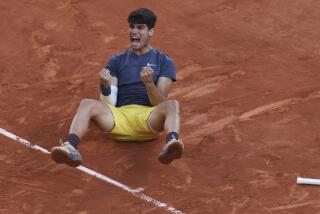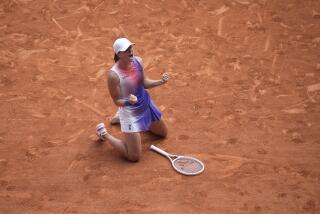It’s Veterans’ Day in Paris
- Share via
PARIS — For anyone expecting a fairy-tale finish to the 1998 French Open, a refresher course is helpful in understanding Saturday’s result.
In 1989, Steffi Graf had a chance to win her second consecutive Grand Slam. Five years later, Mary Pierce was on the verge of becoming the first Frenchwoman to win Roland Garros since 1967.
This year, Monica Seles stood on the threshold of winning her fourth French Open title, a truly remarkable accomplishment in the aftermath of her father Karolj’s recent death from stomach cancer.
But the air of great expectation went rushing out of Roland Garros about as fast as you can say Arantxa Sanchez Vicario. After sixth-seeded Seles knocked a backhand volley out on the final point of her 7-6 (7-5), 0-6, 6-2 loss to the fourth-seeded Sanchez Vicario in the women’s final, it confirmed Sanchez Vicario’s place in tennis history.
The ultimate spoiler.
Now, that isn’t necessarily a bad thing. Sanchez Vicario’s victory was her third French Open championship, and her fourth Grand Slam title. What’s notable is that she is 26, and coming off the worst year of her career. In fact, she was written off in some quarters as an aging veteran trying to keep up with the teenagers.
It was one thing to stop Graf, and Pierce too, but even Sanchez Vicario recognized the special nature of Seles’ bravura performance in Paris. They kissed at the net, and had a long embrace, exchanging more than the usual perfunctory words.
Sanchez Vicario gave an emotional victory speech. Earlier, she had climbed into the friends’ box to hug her mother, her boyfriend Juan, her Yorkshire terrier Roland Garros (complete with a credential around its neck) and other supporters. Sitting in the presidential box, among others, was IOC President Juan Antonio Samaranch, Princess Pilar of Spain and Jamie de Marichalar, the son-in-law of King Juan Carlos of Spain.
“Monica, I’m so sorry I beat you,” she said. “I have a lot of respect for you, especially what happened. All the players feel so sorry for your father’s passing. . . . I don’t think you are the one who deserved to lose.”
Said the 24-year-old Seles: “It definitely does show at any age we’re still very young.”
Sanchez Vicario made a remark, too, about being “the veterans everyone is calling us.” And she and Seles spoke earlier in the locker room together about the old generation still having a few good ground strokes left in them.
For one day, at least, the classy twentysomething generation had supplanted the crass teenagers of the tour. It was far too mistake-ridden to be considered a truly classic final, but there were moments of high drama and some excellent shot-making.
The final was delayed by a little more than half an hour because of an afternoon storm, and the clay court played slower, a benefit to the indefatigable Sanchez Vicario.
What turned the match in the third set was Seles’ inability to convert break points. She had five in Sanchez Vicario’s first three service games, and could not capitalize on any of them and soon trailed, 4-1, in the final set.
“You can’t expect to have that happen [in three service games] and win the match against someone like Arantxa,” Seles said. “I made so many errors against Arantxa, ones you can’t make, starting from some overheads, some volleys and some ground strokes. And I paid for it today.”
Quite simply, the deficit was too sizable. And earlier, Seles hurt herself in the first set with a shaky forehand, inopportune drop shots and a botched overhead.
The blown overhead, one of many, came with Seles leading, 5-3. She was within two points of winning the set, at 30-30, and smashed a relatively easy overhead into the net. The crowd groaned and it seemed to take something out of Seles. A point later, Sanchez Vicario broke her serve, cutting the deficit to 5-4.
In the first-set tiebreaker, Sanchez Vicario squandered a 5-1 lead. Seles pulled even at 5-5 only to lose the set by netting a forehand service return and then hitting a forehand into the net after a long baseline rally.
Seles won the second set in 24 minutes, but it seemed as though Sanchez Vicario was only idling, waiting for the third set.
“She came back and played an unbelievable six games in the second set,” Sanchez Vicario said. “I knew the third set was going to be a different story because we both ran a lot and we were really tired.”
It was Sanchez Vicario’s third victory against Seles in 17 matches, and first on clay. In 1998, she had won a single tournament, at Sydney, before the French Open. But Sanchez Vicario felt her hard work would pay off eventually.
“This is a great moment for me because I think [Monica and I] both have pretty similar years, it’s been very tough for both of us in different situations,” Sanchez Vicario said.
“She is also a great champion, so it was a very tough match. This is especially better for women’s tennis because it shows that we’re still in there. We can make unbelievable matches. It’s much better for the game.”
Seles was composed in defeat and matter-of-fact about her shortcomings Saturday--”I was doing the stupid drop shots today at really weird times”--but she found herself at a momentary loss to reflect on her memories of her first tournament since her father’s death.
“Let me think for a second,” she said. “I really rose to the occasion, I think against Jana [Novotna] and Martina [Hingis], so those were really important wins for me. It’s been obviously a very different two weeks, just because I was able to concentrate on tennis, because I haven’t for a long time.
“From all those points, it’s good. But I hate to reevaluate by saying it’s good or bad. I’m just happy where it is. I know what I need to do, and just go on about it.”
(BEGIN TEXT OF INFOBOX / INFOGRAPHIC)
All-Spanish Men’s Final
* Who: Carlos Moya, seeded 12th, vs. Alex Corretja, seeded 14th.
* Time: 6 a.m. today.
* TV: Channel 4.
STORY: C9
More to Read
Go beyond the scoreboard
Get the latest on L.A.'s teams in the daily Sports Report newsletter.
You may occasionally receive promotional content from the Los Angeles Times.











